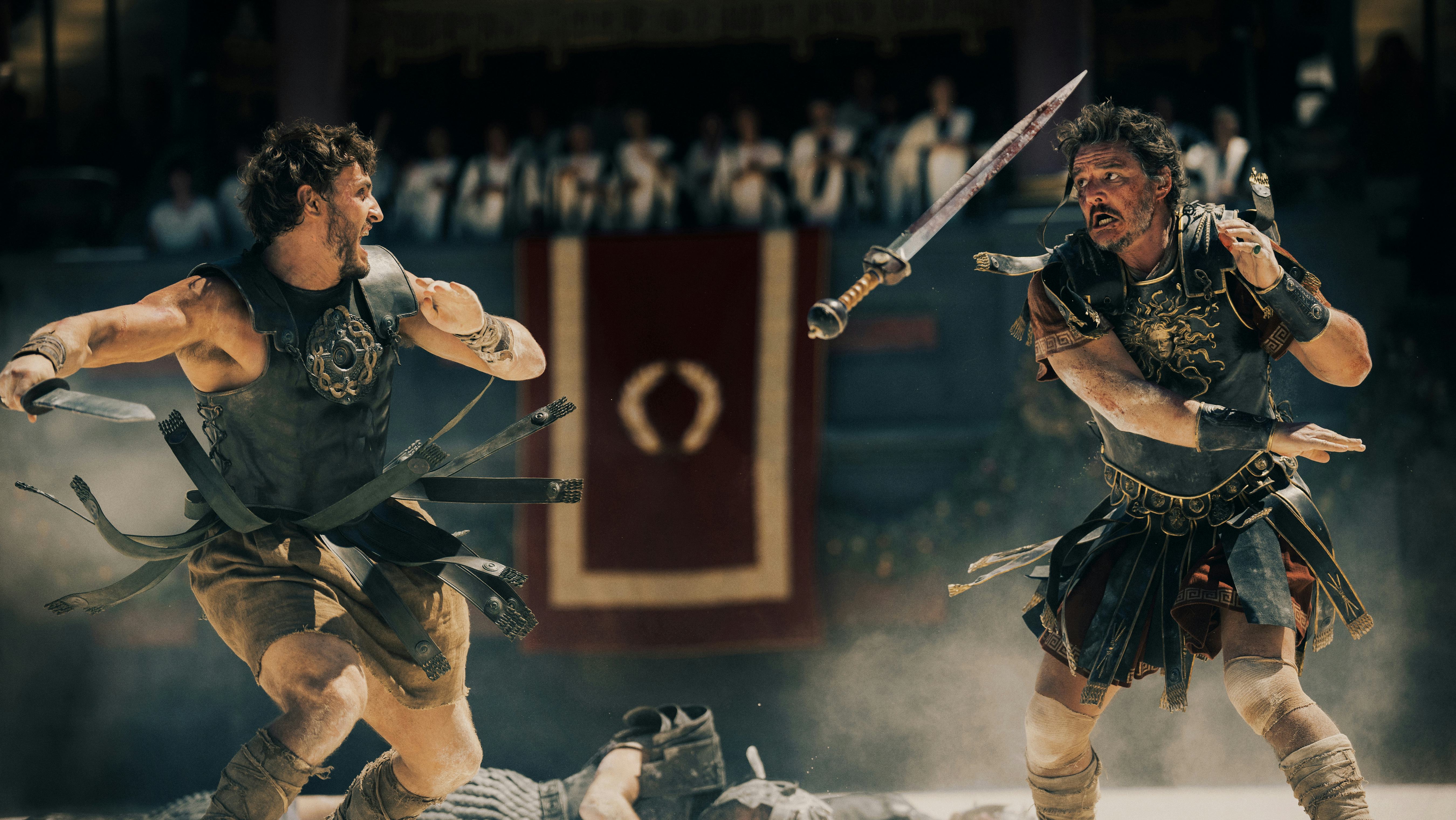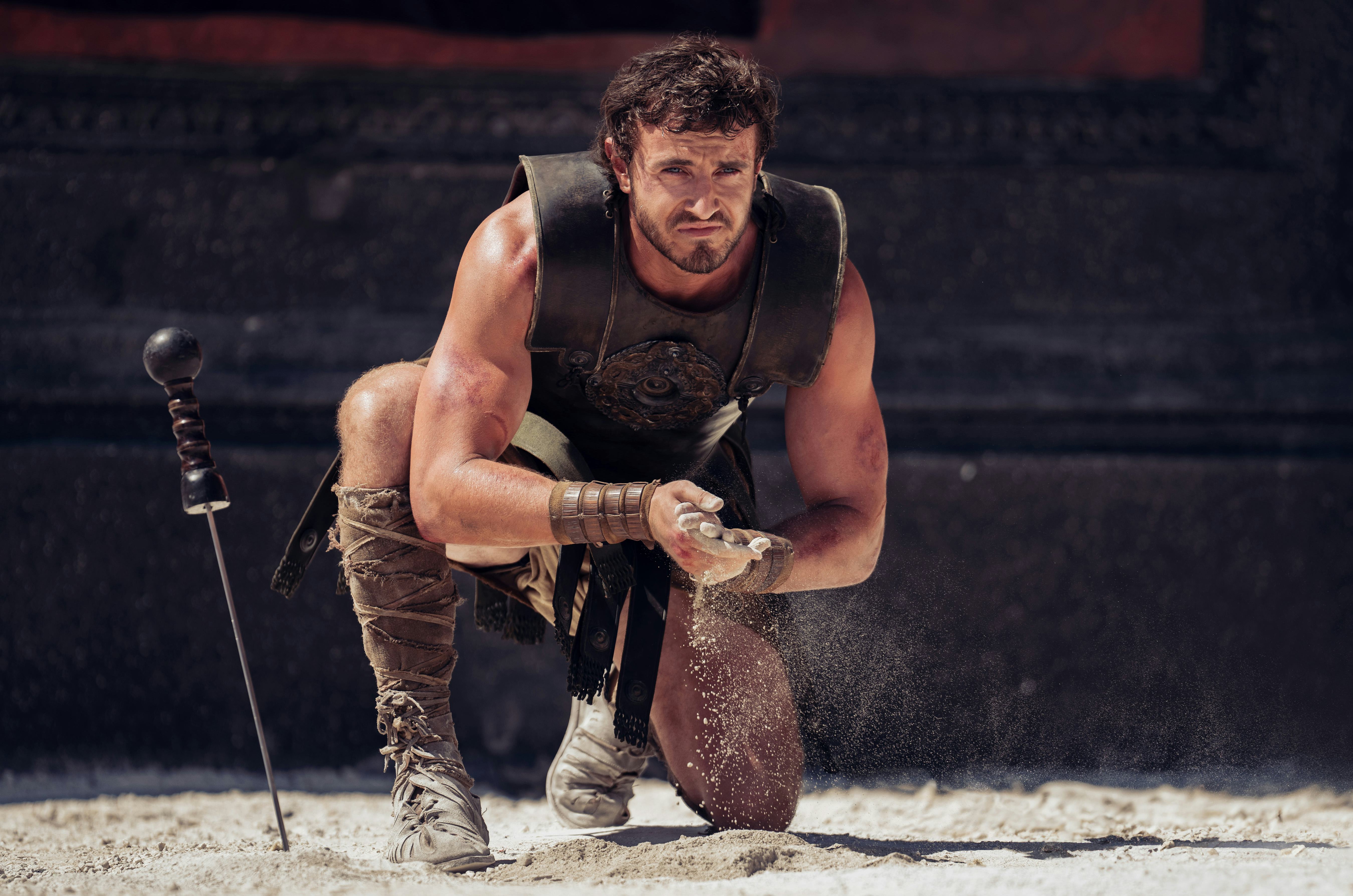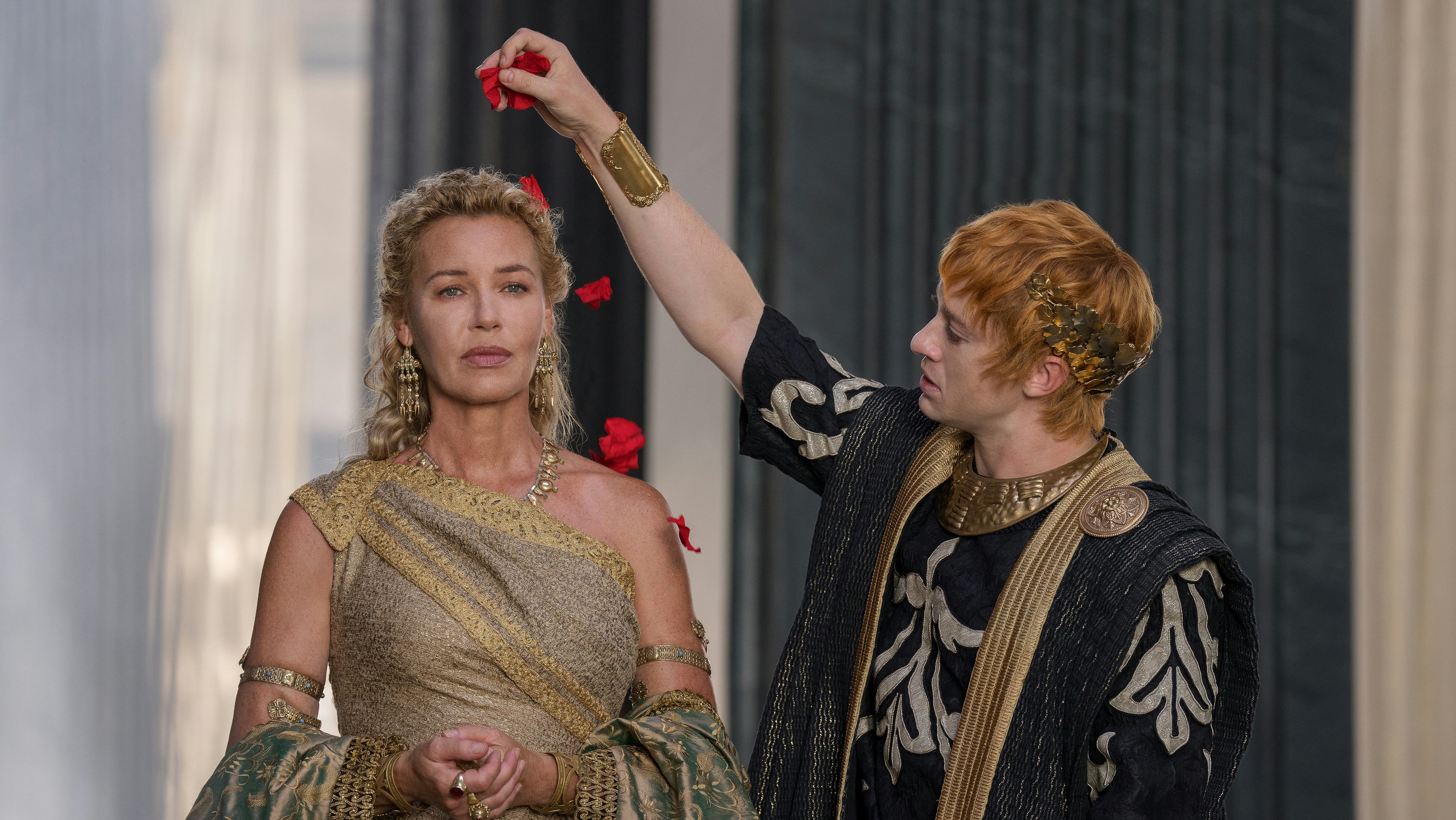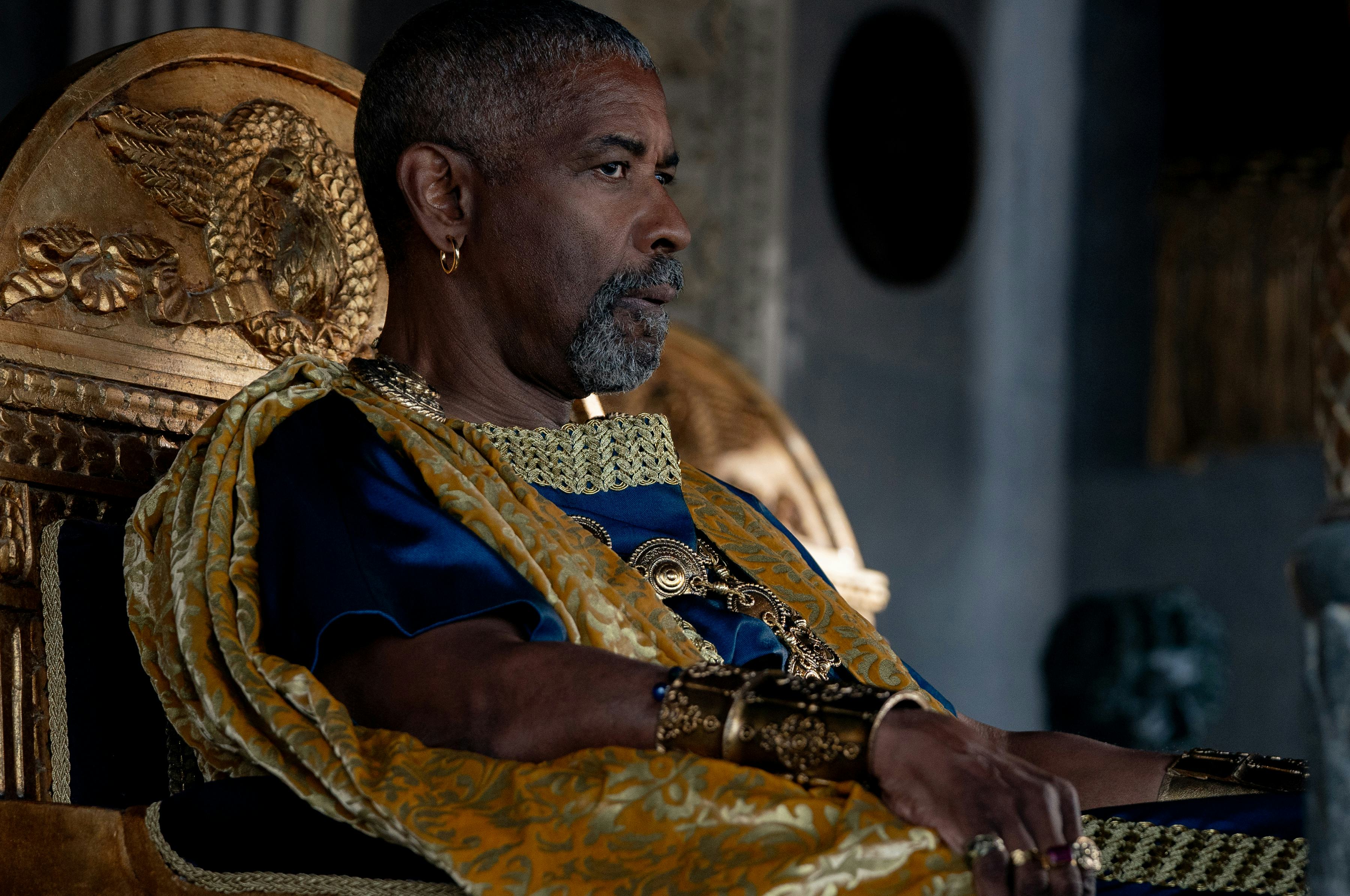
“This city is diseased.”
Paul Mescal's Lucius delivers this line off-hand as he’s brought back to Rome in chains, a scene reminiscent of one in Gladiator, in which the heroic Maximus (Russel Crowe) is similarly enslaved. What Ridley Scott depicted in the 2000 original echoes in 2024 with Gladiator II, but the dialogue in question is a coda to not only what differentiates both movies, but to why Scott's pseudo-remake might be necessary in the first place. It's a darker, more vicious film for a darker, more vicious time, a relevancy that has only grown in recent days. The sequel arrives more than two decades after the relative romanticism of the Clintonian late '90s — the first Gladiator pre-dates September 11th and the Forever Wars — and hits theaters in an era rife with wannabe dictators and rightwing strongmen the world over, from Viktor Orbán in Hungary and Xi Jinping in China, to the recently re-elected Narendra Modi in India and Donald Trump in the USA. The tyrannical villain Commodus (Joaquin Phoenix), Lucius' maternal uncle, may have been defeated on-screen in Gladiator, but it hardly feels that way in real life. And so, the series can't move on.

Taking place nearly two decades after the first film, Gladiator II begins with Lucius, the son of Lucilla (Connie Nielsen) living in secret in North Africa with his wife Arishat (Yuval Gonen). Lucius was but a boy when we last saw him (he was played by Spencer Treat Clark), and the would-be heir to Rome's throne is now a soldier in the local military as it prepares to resist a Roman invasion by sea, spearheaded by the fearsome General Marcus Acacius (Pedro Pascal). Mirroring the U.S. and various Western nations, Rome is still the imperial superpower it once was. Little has changed between entries, and between leaders, so history repeats itself. As was the case with Maximus, whose family perished in Gladiator, tragedy befalls Lucius as well, quickly (if inelegantly) setting the sequel on a trajectory remarkably similar to Gladiator as Lucius swears revenge against Marcus, no matter the cost.
The opening battle scene, while impressive in scale, feels hurried, but perhaps this rush is for the best. It takes Gladiator II a good half hour and change to come into its own, and the process by which it does so is intriguing. As soon as its characters arrive in Rome, and Lucius offers his aforementioned opinion on what was once his home, the film transforms radically within the bounds of the seemingly predetermined path, laid according to its predecessor. Despite Maximus’ sacrifice, things have worsened since Commodus' defeat. Rome is now under the rule of the corrupt and hedonistic siblings Geta (Joseph Quinn) and Caracalla (Fred Hechinger), a pair who prove equally witless and menacing. If Scott’s Napoleon was about the impotence of Trump-like despots, Gladiator II is about the very real threat they pose despite their ineptitude.
The camera, courtesy of returning cinematographer John Mathieson, takes us through more of the city’s decadent interiors, which are covered in gold and built on the blood of Rome's colonial conquests. A senatorial revolt still brews behind the scenes, but that it's led by one of the same figures as in the first movie — Derek Jacobi's Gracchus — justifies the cynicism that emanates from Lucius and pervades the entire film. The resistance is running on a treadmill.

This pessimistic outlook is further embodied by Mescal's fiery performance, which Mathieson in turn lights with flame and shadow (he also creates a much more eerie and shadowy vision of the afterlife this time around). Lucius is a character practically bursting at the seams with fury, much of it aimed at the systems that would allow such violent conquests and widespread enslavement. Lucius has Maximus' role in the plot, but where Maximus believed Rome could be reformed — a belief the revered general espoused even with his dying breath — Lucius has turned his back on his kingdom. This ideological schism is also imbued with rigorous drama, thanks to the reveal that Maximus is Lucius’ father. This isn’t a spoiler; it's mentioned up front as though it were common knowledge, even though there are only roundabout hints of it in Gladiator.
Lucius, who detests the kind of political idealism his father represents, is also slowly but surely lured in by tales of Maximus’ bravery, told to him by the other gladiators. The young prince, perhaps rightly, wants to dismantle everything his family once stood for and leave it in the dust so he can focus on exacting his retribution. However, complicating matters even further is the fact that his estranged mother Lucilla is still a member of Roman royalty and leads its brewing revolution in secret alongside her new husband, Marcus, the very same man Lucius has sworn to slay.

The film's melodrama becomes viscerally exciting once all these cards are on the table, forcing unchecked rage into logistical conundrums about how best to proceed — an all-too-familiar dilemma in the days following the recent presidential election. Can Rome be saved by replacing the people at the top? Or would it best be dealt with by razing it to the ground? Although the film’s conclusions might seem simple and didactic, they’re couched in a pertinent sense of outrage against wealth and authority that grow increasingly callous. It’s hard not to be taken in by such a message, reactionary or otherwise.
Amidst his revenge mission, Lucius — who proves himself a fearsome gladiator — forms an alliance with slave trader and weapons dealer Macrinus (Denzel Washington), a former slave who now slyly navigates the halls of Roman power and seeks it himself. Washington lights the screen ablaze with his Shakespearean delivery and campy, two-faced façade, switching between devious scowls and devilish grins with ease depending on who’s watching. It's a deliciously self-assured performance from an actor at the height of his abilities who crafts a character so delightfully scheming that it’s hard to look away.
Just as riveting are Quinn and Hechinger's effeminate, sadistic rulers, a pair well in over their heads, but whose incompetence and indignation become dangerous, as soon as it becomes clear they can be manipulated. They represent an empire nearly at its end, so lost in conquest that it can't see the chickens coming home to roost, and so depraved that it fails to recognize when it’s ripe for populist mutiny — righteous or otherwise. The question of who will step up (and how, and why) is as central to Gladiator II as that of whether Lucius will exact meaningful revenge, two ideas that eventually come into conflict.

Despite all these complicated, crisscrossing wires, the film is wildly lucid in its anger. For one thing, its action set pieces are ruthless and wonderfully exciting, whether Lucius and his fellow gladiators are forced to fight mutated baboons (the film is anything but historically accurate) or brave the depths of a flooded Colosseum (the flooding is accurate; the sharks, not so much). Scott and screenwriter David Scarpa invent new obstacles with an unfettered glee, which translates into visceral, blood-soaked thrills that Scott shoots with uncomfortable intimacy.
All the while, Lucius' (and the movie's) wrath against systems of oppression become a key thematic backbone. And while the film does eventually give in to familiar, saccharine Hollywood instincts, it refuses to simply pivot towards utopianism on a whim. Rather it forces its characters' hands into the dirt before earning the optimistic streak the original took for granted, crafting a catharsis that feels far more meaningful in 2024, a time when the desire to burn imperial governments and their leaders to the ground is all too familiar.







